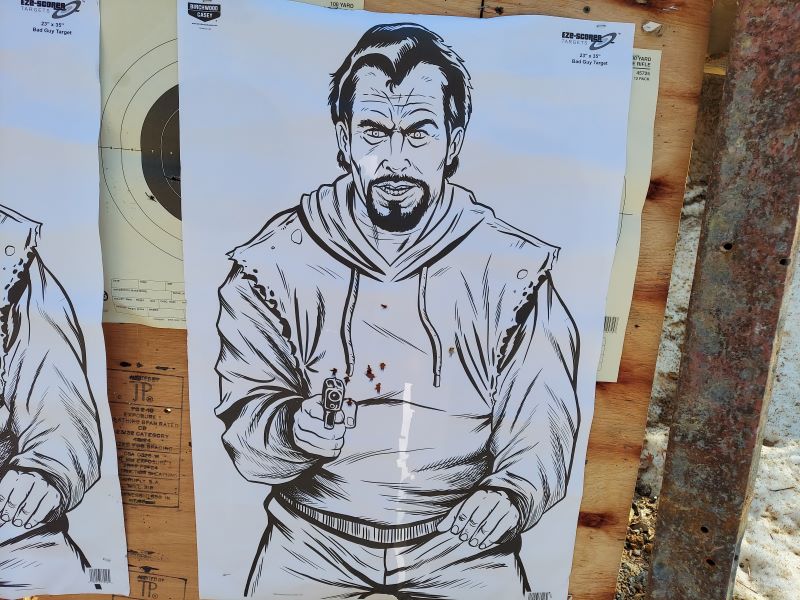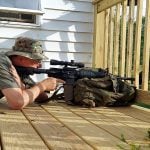Accuracy is defined as “Freedom from error or defect; precision or exactness; correctness. Consistency is simply doing something the same way each time. So which is more important?
Before we get into all of that, we have to ask ourselves what it is we’re intending to do. Am I a competition shooter? A hunter? Is the mission self-defense?
What is the mission?
- Competition
- Hunting
- Self-Defense
Ideally, we want consistent accuracy in all of these endeavors. However, each of those occupations is not necessarily on an equal footing as far as importance. For me, personally, self-defense is the main concern. For obvious reasons, staying alive is a main focus and the chief reason why I carry a firearm.
For the competition shooter, it mostly boils down to fun. Being consistently accurate ensures a lack of embarrassment at matches and cements one’s reputation as a good shooter.
With that said, I know a few competition shooters who need to perform at high levels because it is their occupation. It’s not just fun, it’s their job, their bread and butter. If they don’t shoot well, their sponsors might drop them and it will harm their income. So there’s tremendous pressure to do well.

For most of us, hunting is a fun sport that we do a few times each year. We get out in the woods and relax, enjoying ourselves. But for the person living in the wilds, hunting might be a primary source of food. For that person, the pressure is on to take game, so the importance of consistent accuracy is high.
The Real World
Ideally, we’d love to have both: consistently perfect accuracy. Unfortunately, we live in the real world, where we can’t always have our cake and eat it too. I believe that we need to achieve a balance. It’s wrong to think that we can have either “Accuracy” or “Consistency.” Why not combine the two and have both?
That said, we all know shooters who are either on fire at the range, or they are lacking. They’re either a hero or a zero. This is, most decidedly, not consistent.
I know other shooters who are really not spectacular shots, but they can consistently shoot well enough to get by in whatever endeavors they undertake.
So which shooter is better? The Hero/Zero or the mediocre shooter who does it all the time?
Training
There certainly is an advantage to getting professional training for shooting endeavors.
As a sniper, we engaged in exhaustive training. Contrary to what most people might believe, we didn’t just lay there and bang rounds out all day long on the range; we turned it up several notches. Let me add here that I was a law enforcement sniper and we specialized in Hostage Rescue type shots, for the most part; the sort of shots where a bad guy would be holding a knife or gun to a hostage’s head and we had to thread the needle and take out the suspect.

Snipers routinely practice what is called “Stress Shooting.” As an example, we used to run a distance, then we jogged in place until a whistle was blown. At that point, we hit the deck, loaded our rifle, and had 30 seconds to send a bullet into the medulla oblongata (brain stem) of our target. Missing was not an option.
During that 30 seconds, we had to get our breathing under control and get our heartbeat to a rate that allowed us to actually fire. At every heartbeat, those crosshairs in the scope would jump a little. All of this forced us to override our fatigue and develop a laser-like focus on delivering results. It’s the best way, bar none, that I know of to increase a shooter’s skill level.
We don’t have to run long distances to engage in stress shooting; a short sprint, pushups, sit-ups—anything that raises our heart rate and causes us to fight through fatigue will suffice. Other techniques to distract a shooter and force them to develop concentration include blasting loud music into their ears, trickling ice water on a their back, or shining lights into their eyes. Want to really mess with them? Do all of these things at once! If we can learn to shoot despite distractions, it will seem far easier to make shots when they’re not there. And if we’re shooting in a situation with distractions, then we’ll already be used to it.
Applications
Stress shooting isn’t only for snipers—it can be used to develop the shooting skills of anyone. You can even become a better air gun shooter using these techniques if you want to! It also works for pistol shooting (or anything that fires a projectile).
Results?
Will Stress Shooting make you more accurate? It could very well do that as long as you utilize the fundamentals of marksmanship. Just imagine training in Stress Shooting extensively. When it’s time for us to make a “normal” shot, without being fatigued, it will seem a whole lot easier.
However, beyond increasing our accuracy, the stress shooting will also allow you to develop that focus I mentioned earlier. And that will translate into consistency. Aside from actual shooting ability, you will also develop higher confidence.
Consistency
Why is Consistency important? Because it avoids that hero/zero category. Let’s put it this way: If you’re a competitor, do you want to be able to count on your team members? Or do you want the person who’s “hit-or-miss”? Sure, he or she might be a rock star today. But in tomorrow’s match, they might be totally off, dragging you all down in flames. There’s no continuity.
On the other hand, that team member who manages to do “okay” each and every time is someone who you know will deliver. Sure, they might not be stellar, but they’re solid.
Now imagine being a member of a sniper team. Lives are at stake. We cannot afford to have someone behind the trigger who is “iffy.” The shot has to be made or the wrong person(s) will probably die. This also applies to Hostage Rescue Teams.
Same for self-defense. Lives will be on the line, and possibly those of bystanders who will be shot if we miss. Again, not a great scenario for that “iffy” shooter. But look around at those whom you know—are there any shooters who, at the thought of them shooting defensively, make you cringe? I know a couple. Ugh!
How much is enough?
How much accuracy is enough? It all depends.
If you’re a pistol shooter, do you need to shoot one-inch groups at 25 yards? I’d think that’s asking a bit much. For most of us, that’s impossible. And it all depends on the conditions. For competition, we need to take into account what ranges we’ll be shooting at.

People routinely get hung up on group size. Sometimes they’re overly obsessed with it.
Snipers should be able to fire groups that are sub-MOA (under one inch) at 100 yards, at the least. Hunters typically try to achieve the same standards. However, we have to look at the actual range we intend to shoot. What are the conditions? If it’s on the plains of the Midwest, shots can stretch out for many hundreds of yards. A modicum of accuracy capability would be required for such shots. A rifle with a flat-shooting caliber wouldn’t hurt either.

Where I live, shots can be short in the thick woods. We’d not need to shoot one-inch groups at 100 yards for that. On the other hand, we have some open fields, which give us shots that are a couple of hundred yards long.
For the most part, hunters who can shoot into two or 2.5 inches at 100 yards are probably fine for the type of hunting they will engage in.
The key is being able to realistically evaluate the practical accuracy that we will need to deliver. People often read a few articles or talk to friends who suggest unrealistic “needs” and then think that it applies to everyone, for every situation.
For self-defense, you need minute-of-bad-guy accuracy. Which is to say, putting rounds into the upper chest of a bad guy out to the distance that you deem appropriate. Most self-defense situations occur within about three yards. However, I know people who train out to around 50 yards for self-defense with pistols. Those are extremely different distances for handguns, and so require different accuracy requirements, obviously.
Bottom Line
Precision
I do believe a certain amount of precision is necessary, especially depending upon what pursuit you’re engaging in. If we’re a hunter, we owe it to the game being hunted to be able to put it down quickly and humanely. Wounded game disappoints the hunter and is not fair to the animal.
For competitors, it’s a game. How much of a game it is depends upon whether or not you get paid to do it. As for self-defense, we absolutely need to deliver enough accuracy to ensure the survival of everyone around us.
And law enforcement snipers who are working around all kinds of innocent people need to be rockstars 100% of the time. Nothing else will do.
Consistency
As mentioned, for all of these pursuits, consistency also comes into play, to varying degrees. When lives are on the line, it’s super important. When it’s a game—well, consistently is nice to have.
Which matters more?
Personally, I think consistency matters the most. We can always train a person to be a better shooter; so the skill level can be tweaked. However, if a person is a poor shooter and can’t even maintain consistency at being mediocre, it’s more difficult to address both of those issues.
That said, every single example that I’ve brought up in this article benefits greatly from having a shooter who is consistent. And that is 100%. As far as accuracy goes, it is somewhat flexible. Consistency is not flexible.
This is just my take on things; others are probably going to have differing ideas. The best shooters will find a way to balance out accuracy with consistency and speed. Good luck!


